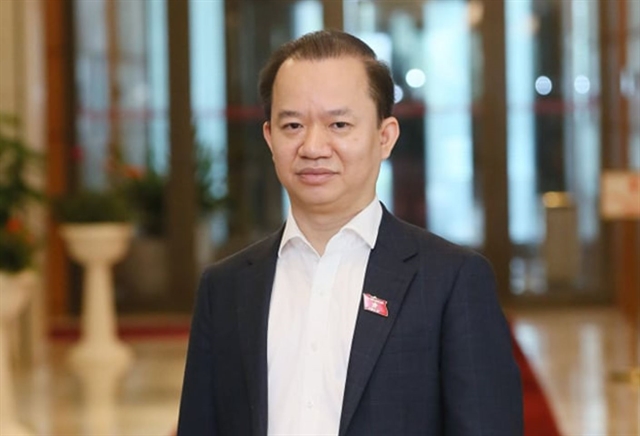 Politics & Law
Politics & Law

 |
| Assoc. Prof., Dr. Bùi Hoài Sơn, Permanent Member of the National Assembly's Committee on Culture and Education. — Photo quochoi.vn |
In an interview with the Tiền Phong (Vanguard) newspaper on streamlining the administrative apparatus, Assoc. Prof., Dr. Bùi Hoài Sơn, Permanent Member of the National Assembly's Committee on Culture and Education, offered valuable insights into the need to empower young officials, retain talent and establish support mechanisms for senior officials as they approach retirement.
The Ministry of Home Affairs is working on policies for cadres and civil servants affected by organisational restructuring. Beyond financial support, what additional measures do you suggest?
I strongly support the creation of mechanisms and policies to assist cadres, civil servants and public employees affected by restructuring. This is not only the responsibility of management agencies but also essential to fostering consensus, cooperation and understanding among those impacted.
Streamlining the organisational apparatus serves the nation’s long-term interests but can create short-term challenges for individuals. Clear and specific support policies are needed to ease concerns and encourage positive responses to change.
In my view, policies should focus on three main areas:
First, provide initial financial support to help individuals sustain their livelihoods during the transition.
Second, implement retraining programmes to enhance skills or support any career transitions, creating new opportunities in other fields.
Third, ensure social welfare benefits, such as insurance and pensions, to prevent disadvantages during restructuring.
These measures reflect humanity in policymaking while encouraging individuals to make sacrifices for the greater good. When cadres feel valued and supported by the State, they are more likely to trust and support reform efforts.
Some suggest introducing policies to encourage cadres nearing retirement to step down early, creating space for younger leaders. What is your perspective?
This proposal deserves attention. It creates opportunities for younger candidates while ensuring rotation and renewal within the management system, aligning with the principles of a streamlined, strong and effective state apparatus. Younger cadres bring fresh energy, innovative thinking and an ability to adapt to modern trends and technologies. Offering opportunities to this generation is an investment in the future and a way to strengthen national leadership resources.
Encouraging seniors to retire early requires fair and humane policies. These should include attractive financial incentives, proportional early retirement packages and comprehensive pension benefits to prevent disadvantages.
Equally important is showing respect and appreciation for the contributions of senior cadres throughout their careers. This approach fosters solidarity and consensus within the political system. Implementation must be gradual and avoid creating feelings of coercion, instead inspiring voluntary sacrifices for the collective good and the development of the next generation.
Amid restructuring, concerns over a brain drain persist. What measures can retain talented individuals in the state apparatus?
This issue is critical, especially during organisational restructuring. Talented individuals are vital for the efficiency and quality of the State’s operations. Without appropriate policies, the risk of losing talent to the private sector increases, affecting sustainable national development.
To retain talent, it is essential to foster a professional, transparent and equitable work environment where individuals can thrive and feel valued for their contributions. Clear career progression and opportunities for merit-based promotions are crucial for growth.
Improving remuneration policies is also vital. Competitive salaries, performance-based bonuses and comprehensive benefits ensure financial stability and properly reward contributions.
Additionally, inspiring a sense of purpose is key. A streamlined, effective State apparatus that prioritises national and public interests will attract individuals motivated by meaningful work, particularly those seeking opportunities to contribute to long-term, impactful initiatives.
Retaining talent in the State is not solely about benefits but also about fostering a professional and appealing work environment. This aligns with broader strategies to improve the political system and State apparatus, meeting the demands of modern governance.
Implementing strong support policies requires significant resources. Where should the State look for funding for these initiatives?
The State must use financial resources wisely, efficiently and with balance. The national budget should serve as the primary funding source. However, restructuring public spending and cutting wasteful expenditures can ease budgetary pressures while creating resources for critical initiatives such as early retirement, retraining and career transitions.
Mobilising reserve funds, such as the Social Insurance Fund, is another viable solution. These funds exist to ensure social welfare and supporting cadres and civil servants during restructuring aligns with this purpose. Public-private partnerships can also play a role, with private enterprises contributing to retraining and career transition programmes.
Savings generated from streamlining the organisational apparatus itself can be reinvested to support these policies, addressing immediate challenges while ensuring long-term sustainability.
What message would you like to share with cadres and civil servants affected by restructuring?
It is natural for cadres and civil servants to feel concerned during organisational restructuring. Change always brings challenges, particularly when it affects livelihoods and careers. However, this is also an opportunity for individuals to reassess their skills and explore new directions.
The State is committed to supporting affected individuals. Policies are being developed to provide retraining, career transition support, establish social welfare guarantees and offer financial assistance.
Even outside the apparatus, the skills and experience gained during public service are invaluable assets. With support and determination, individuals can secure stable positions in new environments.
Restructuring should be viewed not only as a challenge but also as an opportunity to enhance organisational and individual performance. This change is necessary to meet the nation’s evolving needs, and everyone’s contributions, inside or outside the State apparatus, are crucial.
I trust in the resilience and adaptability of every cadre and civil servant to navigate this transition successfully. — VNS




